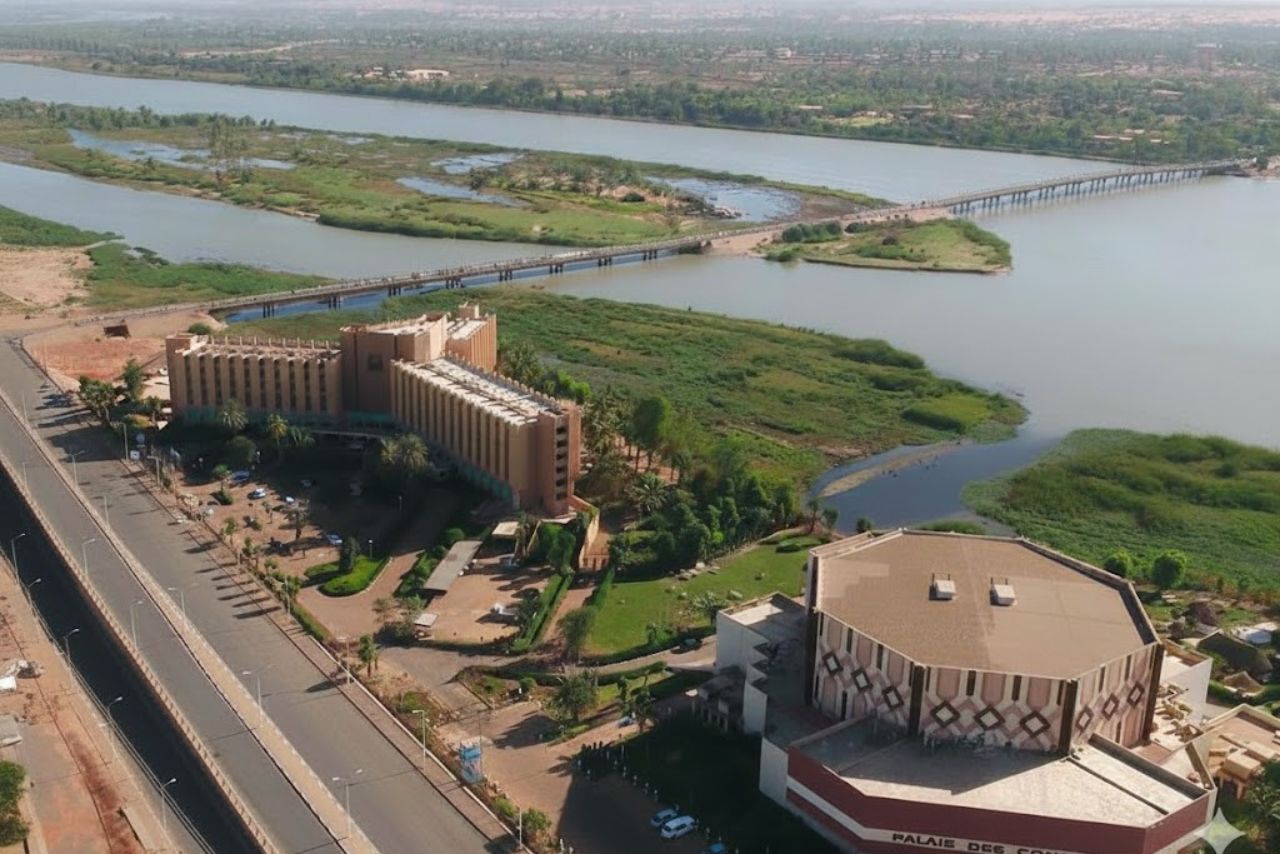Niamey, the capital of Niger, sits proudly along the Niger River, where city life meets sweeping natural landscapes.
Unlike many overrun tourist destinations, Niamey offers an authentic glimpse into West African culture, combining lively markets, peaceful riverbanks, and a warm, welcoming atmosphere.
The city serves as both a hub for cultural experiences and a gateway to the deserts and mountains of northern Niger, creating lasting memories.
A trip to Niamey is about walking through colorful markets, tasting freshly grilled street food, exploring art and history, and venturing into wild landscapes.
Ultimately, Niamey promises experiences that feel genuine, memorable, and often surprisingly affordable.
If you want to know some of the best things to do in Niamey and understand life along the Niger River, this travel guide is for you.
Life by the Niger River
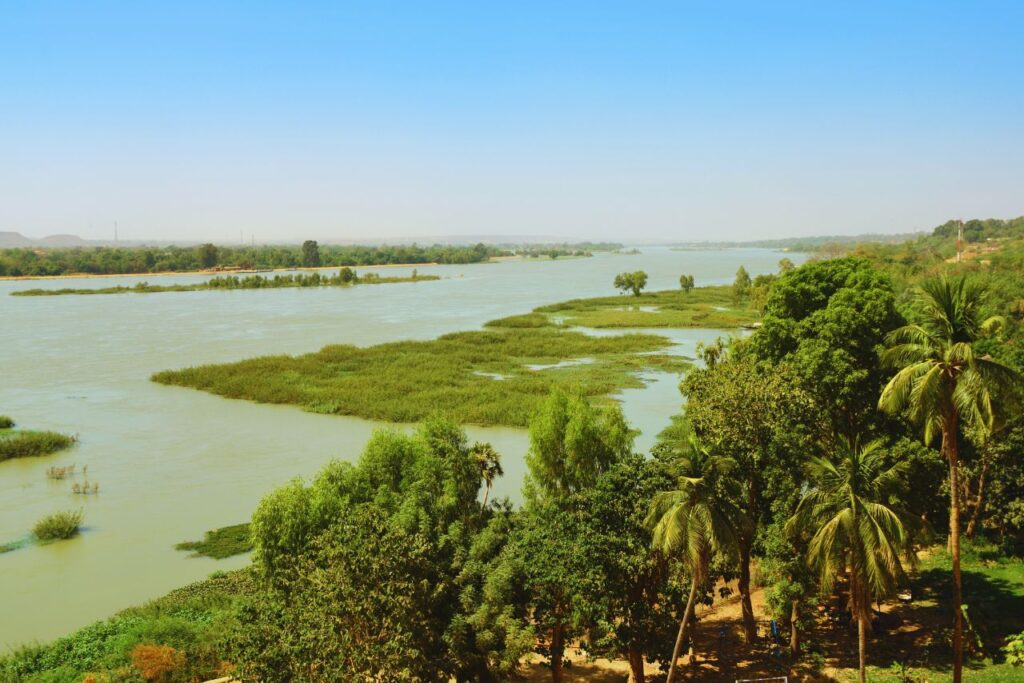
The Niger River is the soul of Niamey.
Its wide, calm waters cut through the city, shaping how people live, work, and relax.
Every day, fishermen paddle in wooden boats, families gather for picnics, and children play along the banks. The air feels different here, slower, softer, and full of quiet movement.
One of the best ways to experience this is by taking a river cruise.
You can hire a pinasse (a traditional wooden boat) and glide past fishing boats, floating markets, and villages that line the river.
Several hotels are located just by the river, including Hotel Gaweye and Grand Hotel.
They’re perfect spots to cool off by the pool, enjoy grilled fish or spicy rice dishes, and watch the slow flow of the river from shaded terraces.
Even without getting on a boat, these riverside hotels give you the best view of Niamey’s natural beauty.
Radisson Blu & Conference Center and Noom Hotel are also amazing hotels in Niamey where you can stay and enjoy the best of the city.
River Activities
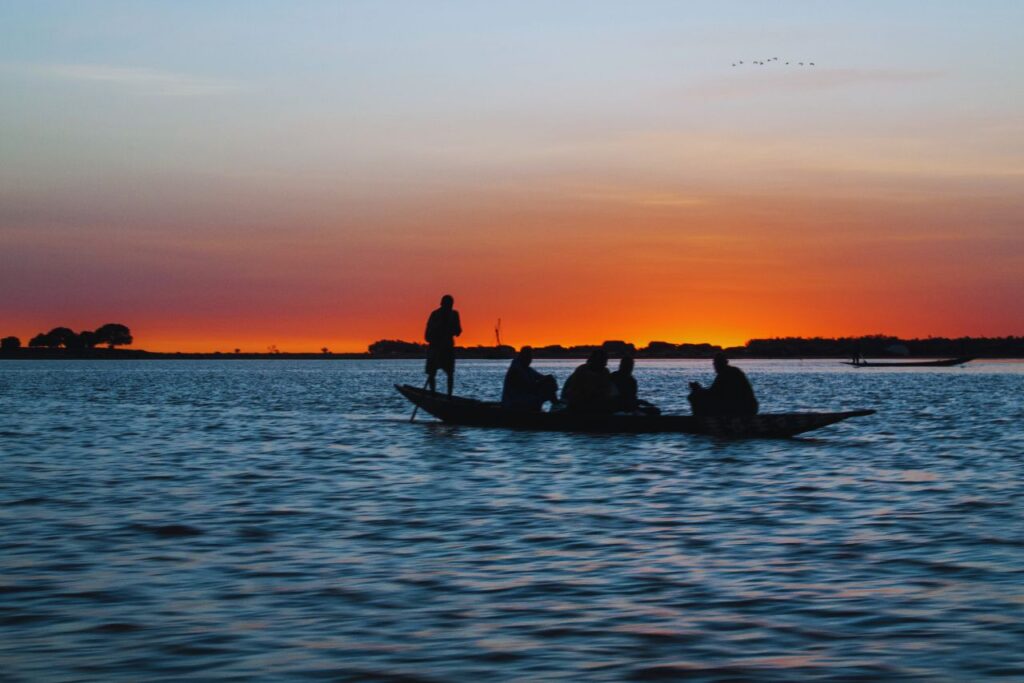
Furthermore, For travelers who want more than relaxation, river activities add adventure to the calm.
Boat rides, fishing trips, and guided wildlife excursions reveal how much life the river holds.
Early morning tours often bring sightings of waterbirds and sometimes hippos, while evening cruises show the river at its most peaceful, glowing under the fading light.
No matter how you choose to explore it, life by the Niger River captures the essence of Niamey.
It’s not just scenery; it’s where the city breathes, connects, and comes alive.
Sitting by its banks or sailing across its gentle waves, you’ll understand why locals call it the lifeline of Niger.
READ ALSO: 100 Best African Safaris to Experience Once in Your Lifetime
Places to visit in Niamey
Grande Mosquée of Niamey
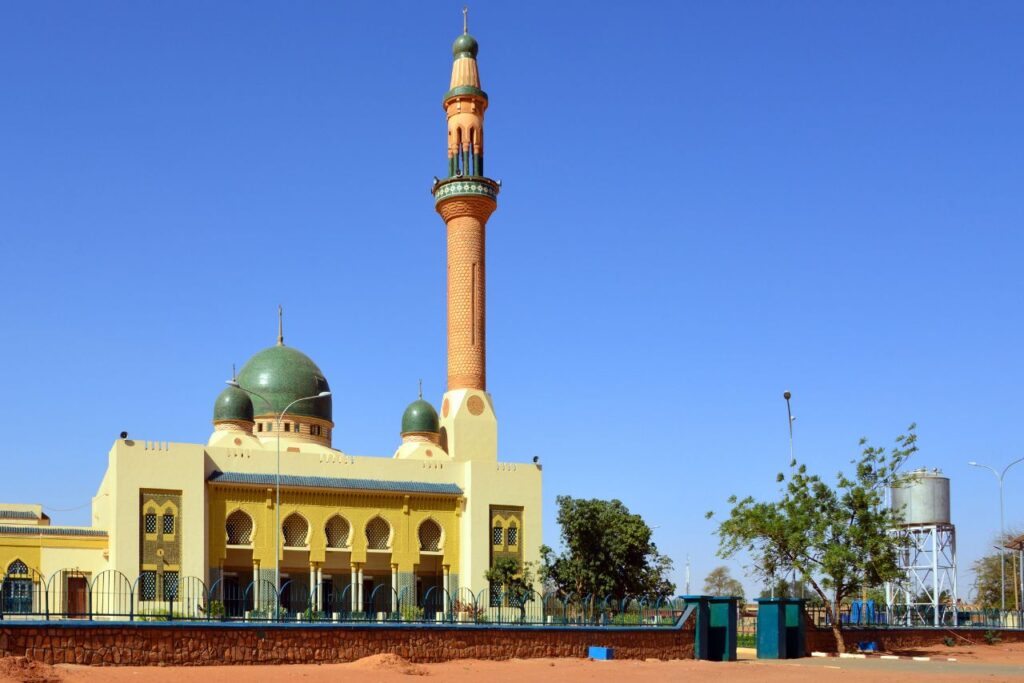
The Grande Mosquée is one of Niamey’s most striking landmarks and a symbol of Niger’s predominantly Muslim population, which makes up about 99% of the country.
Located in the heart of the city, this mosque stands out with its elegant minarets, white facades, and intricate geometric designs.
It reflects traditional Islamic architecture adapted to West African styles.
It’s a serene place of worship, often visited by locals five times a day for prayer, giving the surrounding area a calm and respectful atmosphere.
Visitors can admire the mosque from the outside, and non-Muslims are welcome to explore the grounds outside prayer times.
The area around the mosque offers a glimpse of daily Niamey life, with street vendors, small shops, and quiet streets lined with palm trees.
Central Market (Grand Marché)
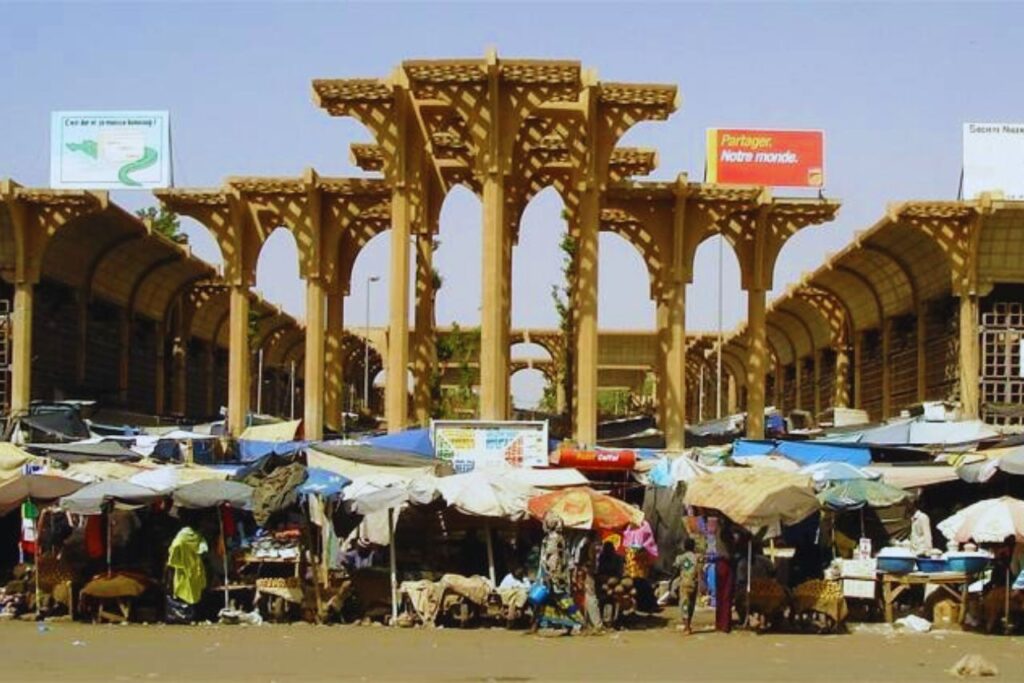
Photo source: niger.dk
The Grand Marché is the heartbeat of Niamey’s commercial life and it is the oldest market in the city.
It hosts over 5000 stalls and is calmer than other markets. These stalls overflow with fabrics, jewelry, spices, and traditional crafts.
Naturally, bartering is expected, making shopping both fun and interactive. Every stall has a story, giving visitors a glimpse into the rich culture of Niger.
Spending a few hours wandering the Grand Marché provides insight into daily life.
Petite marche
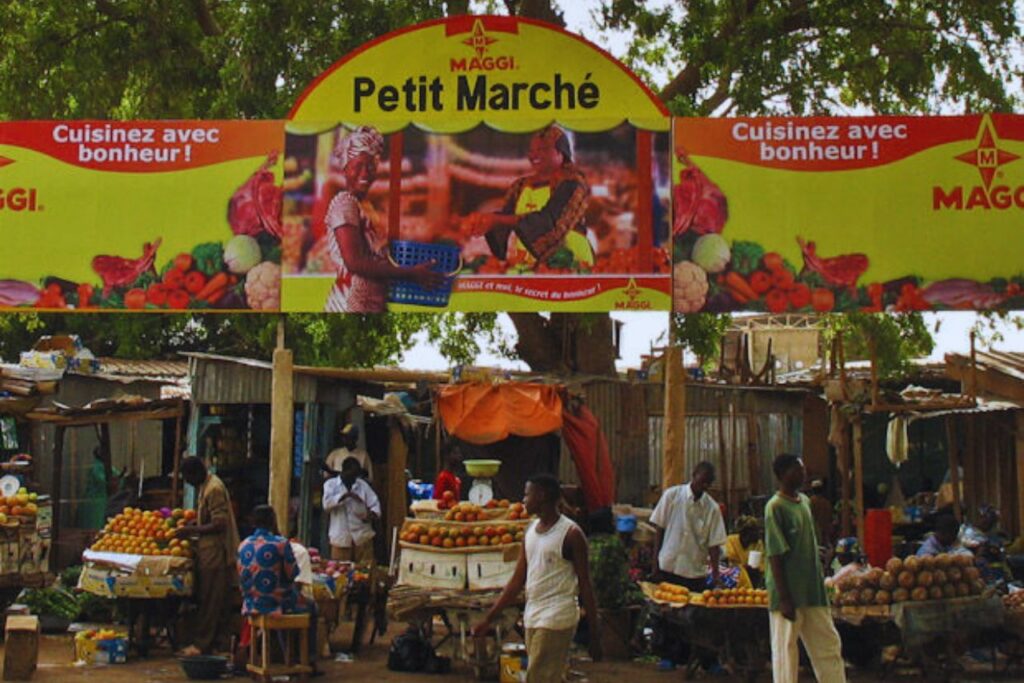
Photo source: visit-niger
The Petit Marché (Small Market) is not just a place to shop; it’s the chaotic, vibrant engine of Niamey’s daily food supply.
It is the premier destination for every kind of fruit, vegetable, and spice.
Unlike the Grand Marché, this market thrives on the bustling, intense energy of sellers and buyers haggling over fresh ingredients.
This offers travelers a truly authentic and lively slice of local life.
National Museum of Niger
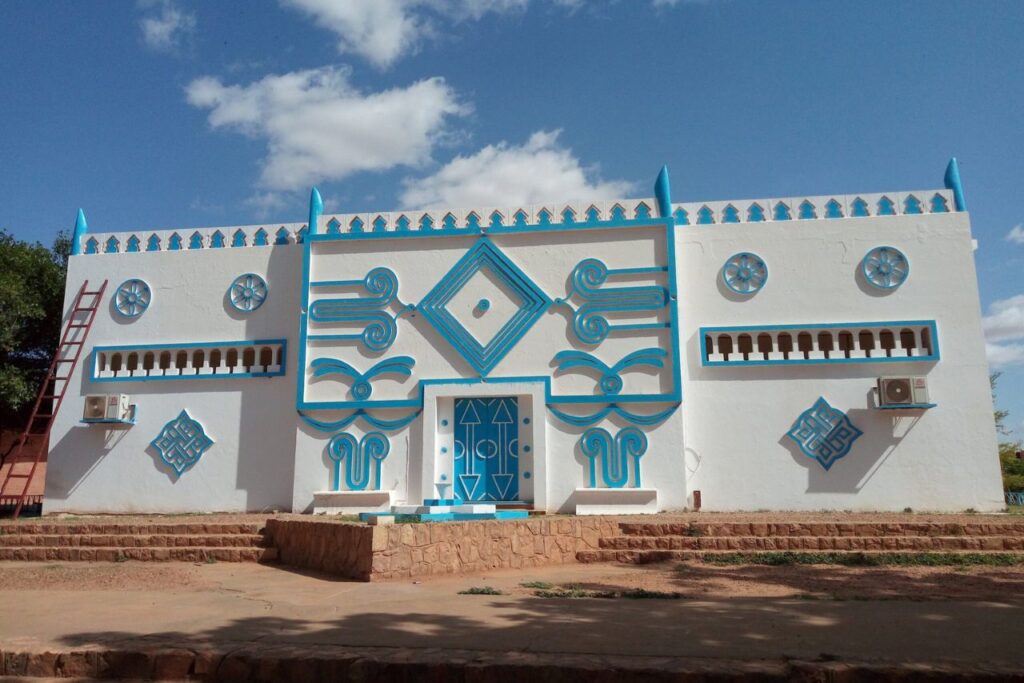
Photo source: museum-explorer
The National Museum of Niger, also known as the Boubou Hama National Museum, is one of Niamey’s most important cultural landmarks.
It showcases the country’s rich cultural and historical heritage, including artifacts from Niger’s various ethnic groups, traditional masks, musical instruments, and tools used in daily life.
The museum is named after Boubou Hama, a prominent Nigerien writer and politician who championed education and culture.
Visitors can explore indoor galleries or wander through the museum’s open-air exhibits, which feature traditional huts, farming tools, and life-size models that depict rural and nomadic lifestyles.
Guided tours (usually around 1,000 CFA francs) provide fascinating insights into Nigerien history, from pre-colonial times to contemporary society.
The Niamey Artisan Village
The Niamey Artisan Village is the capital’s dedicated center for creativity.
It serves as a colorful, low-pressure marketplace where you can browse and purchase authentic handcrafted souvenirs, intricate jewelry, unique textiles, and traditional local artisan products.
Unlike the bustling food markets, the Artisan Village provides a focused cultural experience, making it the perfect place to find a high-quality keepsake from your trip to Niger.
READ ALSO: Cotonou Travel Guide (Benin): Gateway to Ouidah & Cultural Tours
Desert Adventures Near Niamey
Localized desert experiences near Niamey are generally focused on the sandy Sahelian landscapes that immediately surround the Niger River, often combining dunes with river activity.
Sand Dunes and Camping Excursions
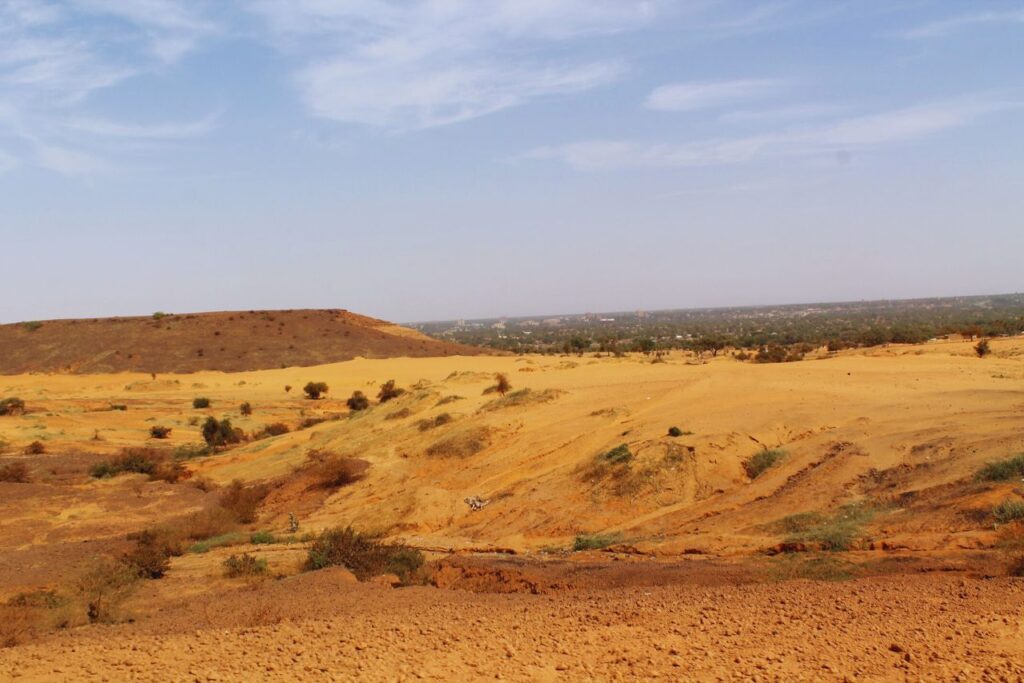
Photo source: nigertravelandtours
Immediately outside of Niamey, the landscape transitions rapidly into the semi-arid Sahel, featuring accessible sand dunes that provide a desert-like experience without requiring a multi-day journey into the deep Sahara.
Experience: Local tour operators offer day trips or overnight camping in the sand dunes near the Niger River (historically at locations like Eheket Desert Safari Camp, although many sites have faced recent closures due to security concerns).
Activity: These excursions typically include BBQs, traditional camping under the stars (often with mosquito nets), and opportunities to play or relax on the dunes.
Reality Check: These areas are not the vast, towering dunes of the Ténéré, but they offer a quick and accessible escape from the city into a desert environment.
Kouré Giraffe Reserve
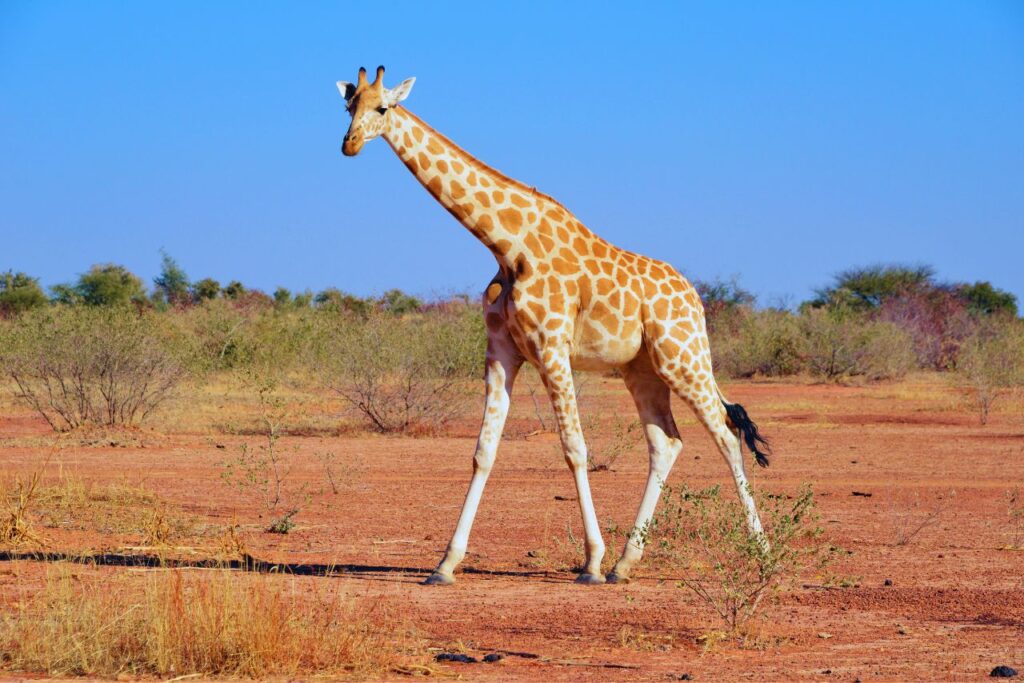
While primarily a wildlife excursion, the Kouré Reserve, approximately 60 km southeast of Niamey, offers the most stable and popular excursion into the authentic, semi-desert Sahelian environment.
Experience: The reserve is characterized by “tiger bush,” a distinctly striped, arid shrubland that is the natural habitat of the West African giraffe.
Activity: Visitors take guided safaris to track and photograph the last wild herd of West African giraffes, offering a unique blend of desert scenery and conservation success.
This tour is often a high priority for international visitors.
Other Desert Adventures in Niger (Beyond Niamey)
As of October 2025, multiple foreign governments advise against ALL TRAVEL to Niger outside of essential travel to the capital, Niamey.
This is due to the volatile political situation, civil unrest, and high risks of terrorism and kidnapping.
Desert adventures outside Niamey are high-risk and heavily restricted.
Journeys to the northern Sahara (Agadez, Ténéré, and Aïr Mountains) are currently considered high-risk and are heavily restricted, often requiring armed military escorts.
Museum of the River (Niamey)
The Museum of the River is a visionary, world-class project planned for an island in the Niger River, likely Isle Gaweye, near the capital, Niamey.
Envisioned as an energy-positive structure, it will showcase Niger’s entire narrative through a series of galleries and walkways.
You will actively explore the nation’s history, starting from Africa’s continental birth billions of years ago, moving through the era of its spectacular dinosaurs (whose remains are excavated nearby).
This exploration will culminate in an understanding of the present-day ecology and living culture of the island and its surrounding waterways.
This institution is designed to powerfully interpret Niger’s immense natural and cultural heritage.
READ ALSO: Bissau Travel Guide (Guinea-Bissau): Islands, Culture & Local Life
Practical Travel Tips for Niamey and Beyond
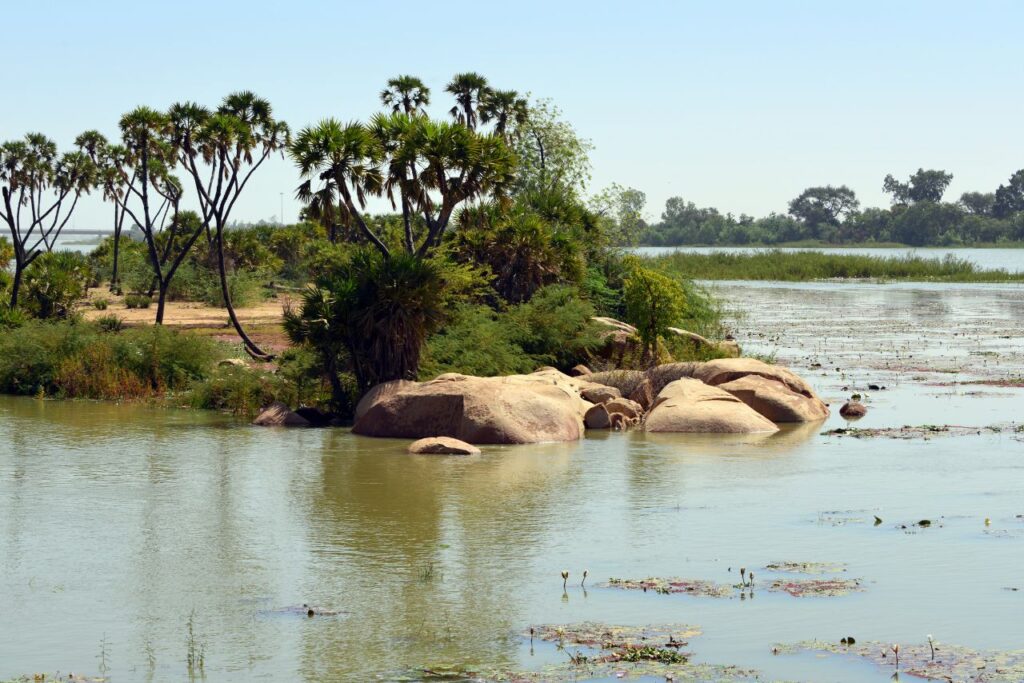
Travel to Niger, and especially outside the capital Niamey, carries high-level warnings from multiple international governments.
This is due to political instability, terrorism, and crime. “Avoid all travel” is the most common advice for regions outside Niamey, with the capital itself under an “Avoid all but essential travel” advisory.
For those with absolutely essential or authorized travel, here are practical tips based on the current security context:
Safety and Security (Crucial)
Heed Travel Advisories
The default advice is to avoid all travel to most of Niger and be prepared for potential civil unrest, terrorism, and kidnapping threats even in Niamey.
Travel Outside Niamey
This is strongly discouraged.
If mandatory, the government of Niger requires an escort by Nigerien security/military forces, and you should use professional security advice, armored vehicles, and travel in convoys during daylight hours only.
Security in Niamey
Violent crime (mugging, robbery) is high.
Be highly vigilant around the Gaweye Hotel, National Museum, Petit Marché, and the bridges over the Niger River (do not cross these on foot).
Be discreet and only use ATMs in public, secure locations (like large hotels), and never at night.
Do not photograph military personnel, security forces, government buildings, or political demonstrations. Ask permission before taking pictures of local people.
Always have your passport or residence permit with you, as checkpoints are common.
Health and Hygiene
A Yellow Fever vaccination certificate is required for entry.
Consult a travel health professional for advice on Malaria prophylaxis (highly recommended), Meningitis, Typhoid, Hepatitis A/B, and Polio booster.
Do not drink tap water. Use only bottled or boiled water with sealed caps. Avoid ice cubes, and be cautious with raw or undercooked food.
Healthcare facilities are poor, even in Niamey. Comprehensive travel insurance with medical evacuation coverage is essential.
Money and Customs
The official currency is the West African CFA Franc (XOF).
Credit cards and ATMs are unreliable and scarce outside major Niamey hotels. Bring sufficient funds in Euros (€) or US Dollars ($) for exchange.
Niger is a conservative society. Dress modestly; wear loose clothing that covers your arms and legs to show respect, especially in rural areas.
If traveling during Ramadan, refrain from eating, drinking, smoking, or chewing gum in public during the daytime.
Avoid using local buses or shared taxis where possible due to safety concerns. Use trusted, registered taxis, and negotiate the fare before.
Connectivity
Mobile networks are decent in Niamey (Orange, Airtel). Internet is slower in rural or desert areas; offline maps are recommended.
Time and Climate
Time zone: GMT+1.
Best time to visit: November–April (dry season, cooler temperatures). Avoid the rainy season (June–September) for easier desert travel.
Final Thoughts
Niamey uniquely combines urban life, riverside serenity, and access to a rich cultural mosaic.
Its inherent affordability, cultural depth, and the natural beauty visible along the Niger River banks offer experiences unlike any other.
However, due to ongoing political and security concerns, all visitors must prioritize safety: travel outside Niamey city limits is strongly discouraged and requires mandatory security escorts.
Within the capital, embracing local customs and focusing on secure, well-known sites like the National Museum and riverside parks offers a journey into the heart of Nigerien history and warm hospitality.
With heightened vigilance and adherence to local security advice, Niamey promises a rich, unforgettable experience while putting personal safety first.

